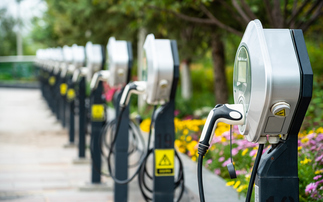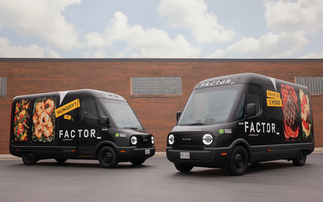Wireless charging technology being trialled outside Nottingham train station may offer a glimpse of the future for electric vehicles
In 2020 it feels safe to assume most people are by now familiar with battery-powered cars, even if only a few have actually ever driven one. There are, after all, more than 270,000 plug-in vehicles on UK roads, and the EV charging points dotted across the country now outnumber petrol stations.
But, how about an EV that forgoes physically plugging into a power supply, and instead charges up its battery wirelessly, simply by briefly parking over a panel on the floor?
To some in the green tech world it may sound like the latest inevitable milestone in fast-moving technological progress which has already seen cars drive themselves hundreds of miles across the UK. But for many people, drawing energy up through the road to power a car no doubt looks and sounds like a futuristic piece of sci-fi kit, most likely to be found on the streets of Silicon Valley.
Yet such technology is far from futuristic - it's operating right now. And you do not have to cross the Atlantic to find it. Instead, the pioneering system is to be found at a train station in Nottingham.
In the coming weeks, a six month pilot is set to kick-off which will see 10 electric taxis charging up just outside Nottingham station via five specially-designed 'pads' installed on the ground, thanks to £3.4m of funding from the government. The project is being carried out via Innovation Gateway, a coalition of organisations set up to share knowledge and innovations to help reduce costs and environmental impacts from the built environment.
The charging technology is situated within a taxi rank, and therefore ring-fenced solely for use by the 10 specially-modified taxis, made up of a combination of LEVC TX electric black cabs - which have now become an everyday sight on the streets of London - and Nissan ENV200 models.
Similar trials have already taken place in other parts of Europe, while in the UK electric car charging tech firm Char.gy last year secured £2.3m from the government to deploy wireless charging on residential streets in Milton Keynes, Buckinghamshire, and the London Borough of Redbridge, in collaboration with Open University and the University of Warwick. But Nottingham train station marks the first major test of its kind for wireless on-the-go charging in the UK, explains Wayne Bexton, head of energy services at Nottingham City Council.
"It's quite straightforward," he tells BusinessGreen. "There's already charging infrastructure on the roadside. It's just added hardware which goes into the ground, so the vehicles pull over, and their batteries are topped up using electromagnetic, wireless charging. Part of the trial is to find out how long it takes to top up the battery to the level required by the drivers."
Indeed, the trial is not just an opportunity to show off flashy tech for the sake of it. The idea, Bexton explains, is to capture data on how cab drivers use the technology, and what kind of benefits it can bring to them, their customers, and the wider use of roads in the city. Indeed, wireless charging will not be suitable for all types and uses of electric vehicles, but for busy cab drivers, a very quick top-up charge between trips could keep their cars going for longer throughout the day without the fear of losing out on business when the battery runs low.
"It could potentially boost a taxi driver's earning potential, as these wireless chargers at the taxi rank allow them to recharge while they're waiting for passengers," Bexton says. "It facilitates shorter, more frequent charging, and benefits vehicles with smaller batteries. It also helps remove some of that so-called 'range anxiety' which has been referred to even by some of the cab drivers committed to taking part of the trial, suggesting there is some nervousness about how long they can drive for, and how many pickups they can do. So I think this technology should hopefully just give them reassurance that running out of battery power isn't going to be an issue."
It may offer a glimpse of the future, but wireless charging perhaps does not yet offer a straight-swap for traditional EV charging via a plug and adaptor, so do not expect to see the technology appearing on household driveways and carparks right across the country any time too soon. That is because it takes longer to charge up a battery wirelessly, which is why it is being tested for top-up taxi charging. Rough early estimates, which the trial is in large part designed to more accurately refine, indicate an 11kWh charging pad might take up to three hours to charge up an EV battery from empty to full, or 4.5 hours for a 7kWh pad, according to Nottingham City Council.
Nevertheless, if the trial proves a hit, the Council hopes to keep the charging panels in place at the taxi rank for the foreseeable future. And, as the technology improves, it potentially offers an efficient top-up solution for electric buses to reduce their downtime, as well as for EV drivers who live in properties without their own garage or driveway from which to directly plug into their mains, explains Bexton.
"It's proven technology, but the trials are aimed at finding out how it actually works on the roads, which could maybe pave the way for more of these, maybe even making them available to members of the public as EV adoption increases," he explains. "If it does work, if someone is going to the shops, they could perhaps leave their vehicle in a parking bay where they could wirelessly top up the battery power with these electromagnetic chargers. Or, when you think about people living in apartments and flats who may not be able to have an opportunity to have a charger themselves, they're going to need the public network to support them owning an EV. So it's these kinds of innovations that I think can help that transition."
It is far from Nottingham's only green transport initiative. With the Council having set an ambitious target to become a carbon neutral city in 2028, it is now publicly consulting on an action plan to get there, and is already well on the way after slashing CO2 emissions by 41 per cent since 2005.
It has already been making significant strides towards reducing traffic and emissions on the roads, too, which Bexton concedes make up a "chunky" part of Nottingham's CO2. Yet thanks to investments in public transport and the city's tram network, as well as around £6m of low carbon vehicle project funding via the government's Office for Low Emission Vehicles (OLEV) initiative, Nottingham has managed to keep traffic and air pollution relatively under control where other similar sized UK cities have often struggled. And it is right into these wider carbon neutrality efforts from the Council that the wireless taxi driving trial slots in.
"It's a case of bringing the taxi drivers on that journey as they are critical for the city's infrastructure," Bexton says. "Other cities have seen a rise in emissions from transport, but we in Nottingham have seen it stay level, which is good."
As is now common sense across the green economy, Nottingham's low transport efforts also link up closely with its policies for energy, of which 24 per cent in the city now comes from local, renewable energy. To take just a handful of examples, there are 5,000 domestic and 60 commercial scale solar PV installations across the city, in addition to the UK's largest district heating network which currently serves 5,000 homes and 150 commercial businesses with excess heat from an energy-from-waste incinerator.
It has not been easy pursuing an ambitious decarbonisation agenda over a decade which has seen council budgets severely squeezed, Bexton acknowledges, but he says the various initiatives have been possible thanks to such strong support from Nottingham residents.
"The whole agenda has been massively embraced," he says. "I think we're starting to see huge interest and enthusiasm for this agenda and the desire to do the right thing across citizens and businesses in Nottingham. We're seeing that shift in people's day-to-day behaviours, and some of the requests that come into the Council around environmental issues. People are a lot more knowledgeable on this agenda than they ever have been, which is great. It really does mean we can get on and support that across the city."
If the wireless electric taxi trial proves a success, cab drivers could be yet another section Nottingham's population who have been won over to the city's ambitious carbon neutral agenda.
This article was sponsored by Innovation Gateway









